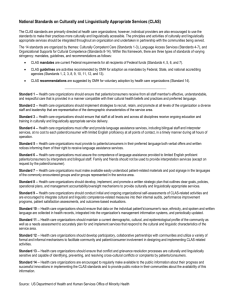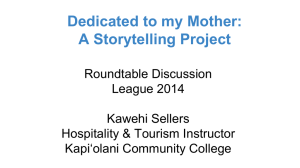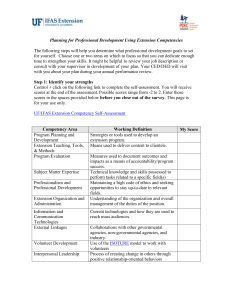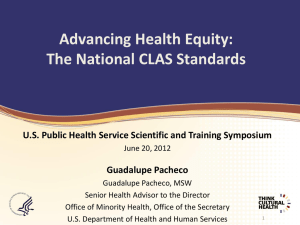CA-802 – Annual Cultural Competency Plan
advertisement
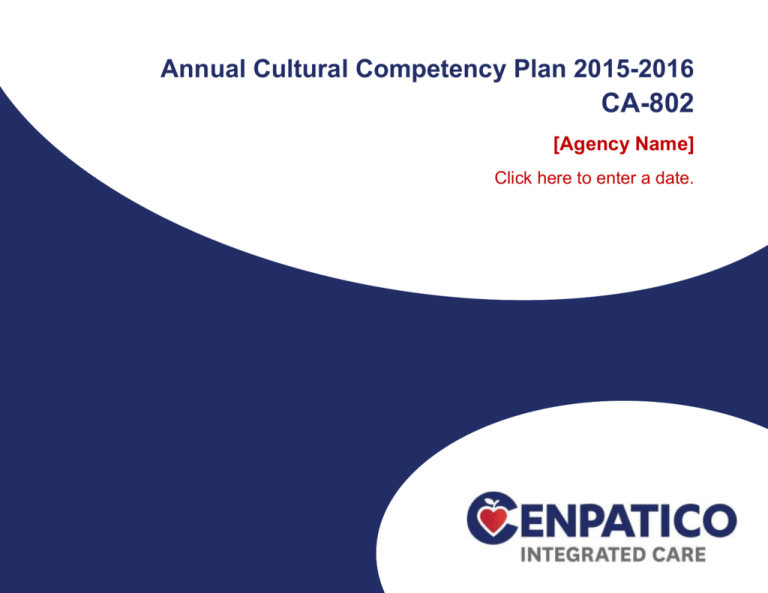
Annual Cultural Competency Plan 2015-2016 [Agency Name] Annual Cultural Competency Plan 2015-2016 CA-802 [Agency Name] Click here to enter a date. Page 0 of 6 Name of Responsible Party: Revision Dates: Annual Cultural Competency Plan 2015-2016 [Agency Name] Health equity is the attainment of the highest level of health for all people. Health inequities result in disparities that directly affect the quality of life for all individuals. Standards of Equal Importance: The original National CLAS Standards designated each Standard as a recommendation, mandate, or guideline. The enhanced National CLAS Standards, however, promote collective adoption of all Standards to promote optimal health and well-being of all individuals. Each of the 15 Standards should be viewed as an equally important guideline to advance health equity, improve quality, and help eliminate health care disparities. Table 1 lists the steps our agency is taking to meet the following standards: Principle Standard: Standard 1 Provide effective, equitable, understandable, and respectful quality care and services that are responsive to diverse cultural health beliefs and practices, preferred languages, health literacy, and other communication needs. Governance, Leadership, and Workforce: Standard 2 Advance and sustain organizational governance and leadership that promotes CLAS and health equity through policy, practices, and allocated resources. Standard 3 Recruit, promote, and support a culturally and linguistically diverse governance, leadership, and workforce that are responsive to the population in the service area. Standard 4 Educate and train governance, leadership, and workforce in culturally and linguistically appropriate policies and practices on an ongoing basis. Table 1 # Action Steps (Strategies, including methods to deliver linguistic and disabilityrelated services by proficient and skilled personnel) Page 1 of 6 Responsible Party (Name and Title) Start/End Dates Status Outcome Measures/Data Sources (expected results, measureable outcomes & outputs) Name of Responsible Party: Comments Revision Dates: Annual Cultural Competency Plan 2015-2016 [Agency Name] # Action Steps (Strategies, including methods to deliver linguistic and disabilityrelated services by proficient and skilled personnel) Page 2 of 6 Responsible Party (Name and Title) Start/End Dates Status Outcome Measures/Data Sources (expected results, measureable outcomes & outputs) Name of Responsible Party: Comments Revision Dates: Annual Cultural Competency Plan 2015-2016 [Agency Name] Table 2 lists the steps our agency is taking to meet the following standards: Communication and Language Assistance: Standard 5 Offer language assistance to individuals who have limited English proficiency and/or other communication needs, at no cost to them, to facilitate timely access to all health care and services. Standard 6 Inform all individuals of the availability of language assistance services clearly and in their preferred language, verbally and in writing. Standard 7 Ensure the competence of individuals providing language assistance, recognizing that the use of untrained individuals and/or minors as interpreters should be avoided. Standard 8 Provide easy-to-understand print and multimedia materials and signage in the languages commonly used by the populations in the service area. Table 2 # Action Steps (Strategies, including methods to deliver linguistic and disabilityrelated services by proficient and skilled personnel) Page 3 of 6 Responsible Party (Name and Title) Start/End Dates Status Outcome Measures/Data Sources (expected results, measureable outcomes & outputs) Name of Responsible Party: Comments Revision Dates: Annual Cultural Competency Plan 2015-2016 [Agency Name] Table 3 lists the steps our agency is taking to meet the following standards: Engagement, Continuous Improvement, and Accountability: Standard 9 Establish culturally and linguistically appropriate goals, policies, and management accountability, and infuse them throughout the organization’s planning and operations. Standard 10 Conduct ongoing assessments of the organization’s CLAS-related activities and integrate CLAS-related measures into measurement and continuous quality improvement activities. Standard 11 Collect and maintain accurate and reliable demographic data to monitor and evaluate the impact of CLAS on health equity and outcomes and to inform service delivery. Standard 12 Conduct regular assessments of community health assets and needs and use the results to plan and implement services that respond to the cultural and linguistic diversity of populations in the service area. Standard 13 Partner with community to design, implement, and evaluate policies, practices, and services to ensure cultural and linguistic appropriateness. Standard 14 Create conflict and grievance resolution processes that are culturally and linguistically appropriate to identify, prevent, and resolve conflicts or complaints. Standard 15 Communicate the organization’s progress in implementing and sustaining CLAS to all stakeholders, constituents, and the general public. Table 3 # Action Steps (Strategies, including methods to deliver linguistic and disabilityrelated services by proficient and skilled personnel) Page 4 of 6 Responsible Party (Name and Title) Start/End Dates Status Outcome Measures/Data Sources (expected results, measureable outcomes & outputs) Name of Responsible Party: Comments Revision Dates: Annual Cultural Competency Plan 2015-2016 [Agency Name] # Action Steps (Strategies, including methods to deliver linguistic and disabilityrelated services by proficient and skilled personnel) Page 5 of 6 Responsible Party (Name and Title) Start/End Dates Status Outcome Measures/Data Sources (expected results, measureable outcomes & outputs) Name of Responsible Party: Comments Revision Dates: Annual Cultural Competency Plan 2015-2016 [Agency Name] Evaluation of the previous year’s efforts In this section, evaluate your previous year’s plan. Provide a list of the major accomplishments. Provide areas for improvement. List additional cultural competency issues identified throughout the year. Identify the unique needs/gaps of underrepresented/underserved populations identified within your agency and community. Page 6 of 6 Name of Responsible Party: Revision Dates:
